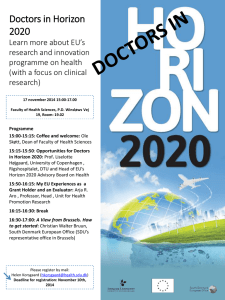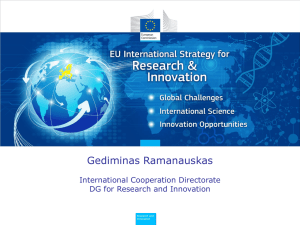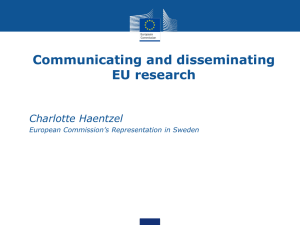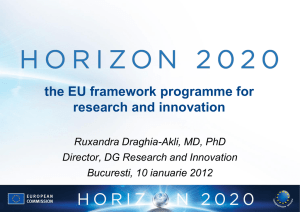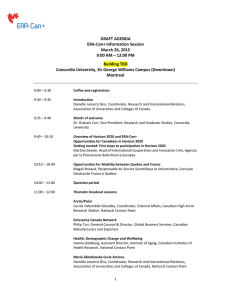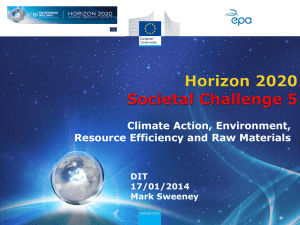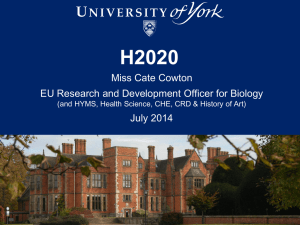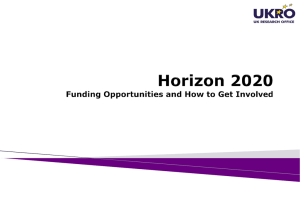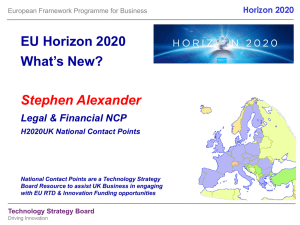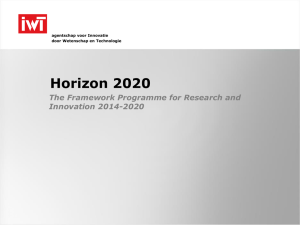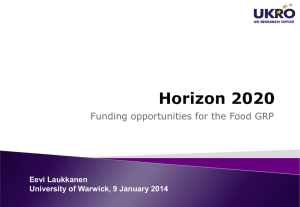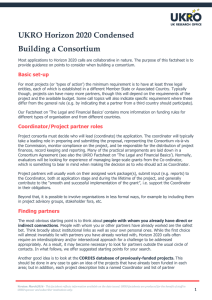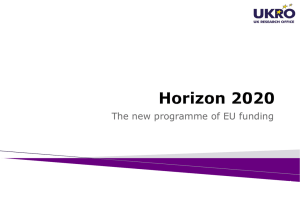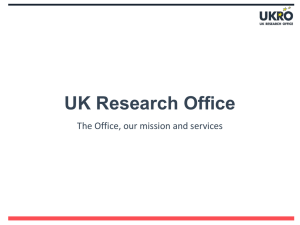presentation - University of Aberdeen
advertisement
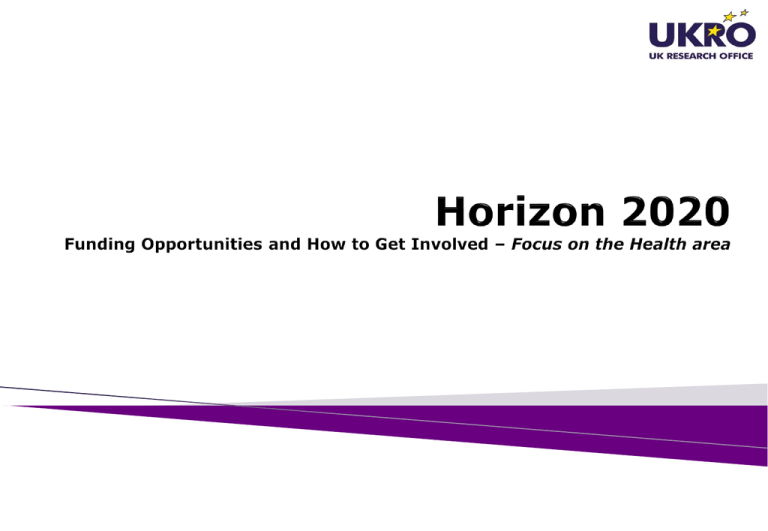
Aberdeen University 14 November 2013 Edward Ricketts edward.ricketts@bbsrc.ac.uk UKRO’s Mission: “To promote effective UK engagement in EU research, innovation and higher education activities” The Office: • Is based in Brussels, was established in 1984 • Is sponsored by the seven UK Research Councils • Around 130 research organisations subscribe to UKRO UKRO Portal: tailored news articles and clear and accessible web pages on the latest in EU funding Enquiry service: individual support through your dedicated European Advisor Annual briefing visits: bespoke training for your institution Meeting room: a venue in Brussels UKRO training and development programme: complementing annual visits UKRO Annual Conference: a key event for EU policy and networking UK National Contact Point: for the Marie Curie Actions and the European Research Council European RTD Insight: Free monthly publication funded by the British Council The EU funding programme for research and innovation from 2014 to 2020 • Budget of €70.2 billion • From research to innovation – from basic research to bringing ideas to the market • Focus on societal challenges EU society is facing (e.g. health, clean energy, food security, integrated transport) • Promise of simplified access for all As at July 2013: • UK-based organisations have been awarded €5.2 billion of FP7 funding, (the second highest share by country, after Germany), equivalent to 15% of the programme’s overall budget • Academic organisations were awarded 62% of this share (thus 10.9% of the entire FP7 budget went to UK academia), and around 17% to SMEs • UK organisations were involved in around 8100 funded projects (the highest number by country) • The highest number of European Research Council grants went to the UK, with around 800 grants based at over 75 different host institutions FP7 Framework Programme Research themes SME participation important Growing importance of innovation Range of funding rates, complex rules Horizon 2020 Integrates FP, EIT, CIP Societal Challenges Strong industry focus overall Covering the entire cycle from basic idea to market Single reimbursement rate for all Excellent Science Industrial Leadership Societal Challenges Health and Wellbeing European Research Council (ERC) Future and Emerging Technologies (FET) Leadership in Enabling and Industrial Technologies (LEIT) ICT, KETs, Space Food security Transport Energy Marie Skłodowska-Curie Actions (MSCA) Climate action Access to Risk Finance Research Infrastructures Societies Security Innovation in SMEs Widening Participation; Science with and for Society European Institute of Innovation and Technology (EIT) EURATOM Joint Research Centre (JRC) Challenge-based, aims to allow freedom to come up with innovative solutions Fewer topics but broader, less prescriptive topics Cross-cutting issues embedded (e.g. social sciences, gender, INCO) Simplified presentation (“common look and feel”) Aim to be relevant to wider range of participants and to provide easy access to newcomers 28 EU Member States (Croatia joined in 2013) Associate Countries (similar list to FP7 expected) • Still under negotiation • Some might not sign agreement in time for Horizon 2020 start but can still apply as long as the agreement is signed in time for grant signature. Third countries (funding will depend on GDP) • BRIC countries no longer eligible for automatic funding Pillar 1 – Excellent Science The ERC seeks to fund the best ‘frontier research’ proposals submitted by excellent researchers in the area of their choice. Will fund projects led by a Principal Investigator, if necessary supported by a research team (no requirement for collaboration or forming consortia across different EU countries). 25 panels in 3 domains which proposals can be submitted to: Physical Sciences and Engineering (PE) Life Sciences (LS) Social Sciences and Humanities (SH) Starting Grants (for PIs 2-7 years since PhD, up to €2 million for 5 years) Consolidator Grants Advanced Grants Synergy Grants (for PIs 7-12 years since PhD, up to €2.75 million for 5 years) (for leading researchers, up to €3.5 million for 5 years) (for 2 to 4 PIs, up to €15 million for 6 years) Proof of Concept (for ERC grant holders only, up to €150,000 for 1 year) Starting Grants Who is a competitive candidate? Must be able to show potential for excellence and evidence of maturity: • expectation for at least one important publication without the participation of the PhD supervisor • promising track record of early achievements appropriate to field and career stage, including: • significant publications (as main author) in major international peer-reviewed journals • and/or monographs • invited presentations, granted patents, awards, prizes etc • good leadership potential and must convince the ERC panel that the PI will be able to lead an ambitious ‘frontier research’ project Proposals evaluated solely on the basis of excellence (excellence of the PI and of the research project), and should address: Extended Synopsis (5 pages) Scientific Proposal (15 pages) • • • • To what extent does the proposed research address important challenges? To what extent are the objectives ambitious and beyond the state of the art? How much is the proposed research high risk/high gain? To what extent is the outlined scientific approach feasible? • To what extent is the proposed research methodology appropriate to achieve the goals of the project? To what extent does the proposal involve developing novel methodology? To what extent are the proposed timescales and resources necessary and properly justified? • • * please note that this is the wording from the 2013 ERC calls Starting Grants: opens 11 December 2013, deadline 25 March 2014 Consolidator Grants: opens 11 December 2013, deadline 20 May 2014 Advanced Grants: opens 17 June 2014, deadline 21 October 2014 Synergy Grants: no call launched in 2014 Proof of Concept: opens 11 December 2013, two deadlines on 1 April and 1 October 2014 Marie Skłodowska-Curie Actions Operates in a ‘bottom-up’ basis, open to all research and innovation areas Mobility is a key requirement Key areas supported: • • • • Fostering new skills by means of excellent initial training of researchers Nurturing excellence by means of cross-border and cross-sector mobility Stimulating innovation by means of cross-fertilisation of knowledge Co-funding of activities FP7 ITN Horizon 2020 ITN Innovative Training Networks (Early Stage Researchers) IEF IOF IIF IF Individual Fellowships (Experienced Researchers) CIG IAPP IRSES COFUND RISE COFUND Research and Innovation Staff Exchange (Exchange of Staff) Cofunding or regional, national and international programmes Major differences compared to FP7 • Participants defined as ‘academic’ and ‘non-academic’ • Early stage researchers (ESRs) only • The Innovative Doctoral Programme strand moved to the COFUND scheme The ITN scheme consists of 3 strands European Training Networks (minimum of 3 participants) European Joint Doctorates (at least 3 academic participants who can deliver a doctoral degree) European Industrial Doctorates (1 academic participant and 1 nonacademic participant) European and Reintegration Fellowships •12-24 months Global Fellowships •From any country to MS/AC •12-24 months plus 12 month return phase •Host country is subject to the MSCA mobility rule •Secondment from MS/AC to third country •(Reintegration Fellowship only) mobility to Europe, researcher must have been a long-term resident (at least 3 years) in Europe •Mandatory 12 month return phase in Europe (not subject to mobility rule) •(European Fellowship only) separate multi-disciplinary career break panel Mobility rule for the career re-start panel “researchers shall not have resided or carried out their main activity in the country of their host organisation for more than 3 years in the 5 years immediately prior to the relevant deadline” Call Opens Closes Budget ITN 2014 11 Dec 2013 8 April 2014 350 M IF 2014 11 Dec 2013 10 April 2014 175 M NIGHT 2014 11 Dec 2013 4 March 2014 7.8 M COFUND 2014 8 July 2014 18 Nov 2014 80 M ITN 2015 2 Sep 2014 21 Jan 2015 386 M RISE 2015 30 Sep 2014 15 Jan 2015 80 M IF 2015 11 Dec 2014 14 April 2015 190 M Expanded from ICT and Energy to be used as cross-cutting funding scheme Supports frontier research: alternative ideas, concepts or paradigms of risky or non-conventional nature Open, light and agile FET Open •‘Fostering novel ideas’ •Individual research projects •Early ideas •Coordination and support activities Roadmap based research FET Proactive •‘Nurturing emerging themes and communities’ •Open research clusters •2 topics: Global Systems Science (GSS); Knowing, doing being: cognition beyond problem solving High-Performance Computing (HPC) Strategy Developing the next generation towards exascale 3 call topics FET Flagships •‘Tackling grand Interdisciplinary science and technology challenges’ •Common research agendas •Graphene •Human Brain •Support to Flagships Pillar 2 – Industrial Leadership Strong focus on industrial involvement and applied research Developing industrial capacity in focus areas: • Key Enabling Technologies (KETs) Micro- and nano-electronics Photonics Nanotechnologies Advanced Materials Biotechnology Advanced Manufacturing and Processing JTIs support large-scale multinational research activities in areas of major interest to European industrial competitiveness and issues of high societal relevance Long-term public-private partnerships - combining private sector investment with European public funding and sometimes also national funding Set up as separate legal entity (Joint Undertaking) Led by industry, but open to new partners from universities and research institutes Calls launched and managed by the Joint Undertaking Same reimbursement rate as in rest of Horizon 2020 will apply (some derogations) “Improving the health and well-being of European citizens by providing new and more effective diagnostics and medicines, while helping safeguard the international competitiveness of the European biopharmaceutical industry.” Increase the success rate in clinical trials of priority medicines Reduce the time to reach clinical proof of concept in medicine development Develop new therapies for diseases for which there is a high unmet need Develop diagnostic and treatment biomarkers for diseases clearly linked to clinical relevance and approved by regulators Reduce the failure rate of vaccine candidates in phase III clinical trials Improve the current drug development process JTIs • Bio-Based Industries • Clean Sky2 • Electronic Components and Systems (ECSEL) • Fuel Cells and Hydrogen (FCH2) • Innovative Medicines (IMI2) New generation of components and systems Content technologies and information management Advanced Computing Future Internet Robotics Micro- and nano-electronic technologies/ Photonics Cross-cutting and horizontal activities and International Co-operation See draft 2014 Work Programme at: http://www.ukro.ac.uk/subscriber/Pages/131107_draft_ict_wp_public.aspx Future Internet Public Private Partnership Health: e-health, self management of health, improved diagnostics, improved surveillance, health data collection, active ageing, assisted living; • “Advancing active and healthy ageing with ICT: Service robotics within assisted living environments” • “Advancing active and healthy ageing with ICT: early risk detection and intervention” • “Advanced ICT systems and services for integrated care” • “self-management of health and disease: decisional support systems and patient empowerment supported by ICT Food: • Ocean observation technologies “Acoustic and imaging technologies” • “Forecasting and anticipating effects of climate change on fisheries and aquaculture” • “Improved data and management models for sustainable forestry” Replaces Research for Benefit of SMEs scheme Dedicated SME instrument Target highly innovative SMEs looking to develop and grow in international environment Funding awarded to single company, but projects can be collaborative Allows for outsourcing of research Three-stage support through innovation cycle One project can access all three in order One application per year Stage 1: Feasibility • 6 month project • ~ €50k lump sum funding • to assess technological / commercial potential of project Stage 2: Innovation Activity • 12 – 24 month duration • €1m - €3m funding • Emphasis on demonstration and market replication Stage 3: Commercialisation phase • No direct funding • Simplified access to debt and equity financial instruments • Assistance with IPR protection Pillar 3 – Societal Challenges Concerns of citizens and society + EU policy objectives Breakthrough solutions come from multi-disciplinary collaborations, including social sciences and humanities Addressing challenges requires full research & innovation cycle, from research to market Focus on policy priorities without predetermining technologies or types of solutions to be developed Personalising health and care Sustainable food security Blue growth Smart cities and communities Competitive low-carbon energy Energy efficiency Mobility for growth Waste Water innovation Overcoming the crisis Disaster resilience Digital security Health Personalising Health and Care Food security Sustainable Food Security, Blue Growth, Innovative, Sustainable and Inclusive Bioeconomy Energy Energy Efficiency, Low Carbon Energy, Smart Cities and Communities Sept Transport Mobility for Growth, Smart Cities and Communities, Blue Growth June Climate Action Waste, Water Innovation, Disaster Resilience Societies Overcoming the Crisis, Smart Cities and Communities Security Digital Security, Disaster Resilience Dec H2020 Context – Health Challenge ~ 25% • “Effective health promotion, supported by a robust evidence base, prevents disease, contributes to wellbeing and contains costs” • Societal challenge to adjust to further demands on health and care sectors – support integrated care Specific Priorities 1. Understanding health, wellbeing and disease o o o Understanding the determinants of health, improving health promotion and disease prevention Improved understanding of health and disease Improving surveillance and preparedness 2. Preventing Disease o o o Developing effective prevention and screening programmes + assessment of disease susceptibility Improving diagnostics and prognosis Better preventive and therapeutic vaccines Specific Priorities 3. Treating and managing disease o o Treating disease, including developing regenerative medicine Transferring knowledge to clinical practice and scalable innovation actions 4. Active ageing and self-management of health o o Active ageing, independent and assisted living Individual awareness and empowerment for selfmanagement of health Specific Priorities 5. Methods and data o o o Improving health information and better use of health data Improving scientific tools and methods to support policy making and regulatory needs Using in-silico medicine for improving disease management and prediction 6. Health care provision and integrated care o Promoting integrated care o Optimising efficiency and effectiveness of healthcare provision and reducing inequalities by evidence-based decision making 2014-2015 Calls divided into 8 specific activity areas: • Understanding health, aging and diseases • Effective health promotion, diseases prevention, preparedness and screening • Improving diagnosis • Innovative treatments and technologies • Advancing active and healthy aging • Integrated, sustainable, citizen-centred care • Improving health information, data exploitation and providing an evidence base for health policies and regulation • Co-ordination activities e.g. AHA EIP; More years, Better Lives; Global Alliance for Chronic Diseases The Leadership in Industrial and Enabling Technologies Societal Challenge 2 Societal Challenge -6 Societal Challenge 7 1. Scale-up of nanomedicine production 2. Networking of SMEs in the nanobiomedical sector 3. Biomaterials for the treatment of diabetes mellitus 4. Nanomedicine therapy for cancer 5. Biomaterials for treatment and prevention of Alzheimer’s diseases 1. Assessing the health risks of combined human exposure to multiple foodrelated toxic substances 2. Improving the control of infectious epidemics and foodborne outbreaks through rapid identification of pathogens 3. Tackling malnutrition in the elderly 1. Always more inequalities? New views on equality, solidarity and democracy 2. Early job insecurity and labour market exclusion 3. Youth mobility: opportunities, impacts, policies 4. Inclusive and sustainable urban planning for a modern society 1. Feasibility study for strengthening capacity-building and security protection in case of large-scale pandemics 2. Crises and disaster resilience – operationalizing resilience concepts Horizon 2020 Health - Context EIP Active and Healthy Ageing Health for Growth Health, Demographic Change and Wellbeing Ambient Assisted Living Research Innovation Structural Funds Deployment Initiatives led by EU Member States which combine aspects of national research programmes Address major societal challenges Aim to reduce fragmentation and avoid duplication 10 JPIs have been established to date JPIs establish Strategic Research Agendas and are likely to have an influence on Horizon 2020 work programme development Seeks to improve coordination and collaboration between European and national research programmes related to demographic change = National research councils pooling funding and launching joint calls. First joint activity launched in early 2013, on mapping the range of data sources on ageing in Europe. Definition of demographic change covers: health to social welfare, education & learning, work & productivity to housing, urban & rural development and mobility. 13 European countries are currently participating, including the UK through the ESRC. See: http://www.jp-demographic.eu/ for more details. Initiatives which bring together wide range of partners to address a particular societal challenge. Not a funding instrument. Overarching target of the EIP AHA is to increase, by 2020, the average healthy lifespan in the EU by 2 years. Strategic Implementation Plan identifies 14 priority areas. Action Groups and online ‘Marketplace’ are up and running. EIP aims and objectives will be reflected in Horizon 2020 work programmes. See EIP AHA website: http://ec.europa.eu/research/innovationunion/index_en.cfm?section=active-healthy-ageing Innovative Medicines Initiative homepage http://www.imi.europa.eu/ European and Developing Countries Clinical Trials Partnership homepage - http://www.edctp.org/ More Years Better Lives homepage - http://www.jpdemographic.eu/ Joint Programme on Neurodegenerative Disease homepage http://www.jp-demographic.eu/ Joint Programme on Antimicrobial Resistance homepage http://www.jpiamr.eu/ How to get involved Publication of work programmes and calls for proposals: • The first work programmes will cover 2014 and 2015 • The first calls are expected to be launched in December Work programmes explain what is funded (topics, grant schemes) and the expected policy impact Calls for proposals give details on the timeline (deadline, evaluation, results) and the eligibility criteria Check the Horizon 2020 draft work programmes - do they cover your research area? Activate your current networks – do you need to expand them? Who are the key players? Who has been involved in previous projects? Check FP7 Projects http://cordis.europa.eu/fp7/projects_en.html Attend EC information days, events & conferences Join the EU evaluators database (http://ec.europa.eu/research/participants/portal/page/experts) Check out partner searches: UKRO can distribute partner profiles / National Contact Points (NCPs) / IDEAL-IST (ICT research), Fit for Health (Health research), NET4SOCIETY (SSH research) / Enterprise Europe Network / Social Media? (Linked-in etc) / IGLO partner search (Informal Group of European RTD liaison offices) Some areas, such as Marie Curie, ERC and FET Open are bottom-up Sign up to the UKRO portal and you will receive: Updates on the likely funding priorities for Horizon 2020 in each planned area Updates on key events Updates on call dates and management/financial issues Updates on opportunities to feed in to the programme’s development (i.e. formation of expert advisory groups, evaluator registration, other calls for expressions of interest) ‘UKRO understands’: early information New: UKRO Horizon 2020 Factsheets! Practical aspects of Horizon 2020 Single funding rate per project: • 100% for research projects • 70% for innovation projects (100% for non-profit organisations including universities) • Rate and type of project defined in the Work Programme Indirect costs: flat rate of 25% No time sheets for staff working full-time on Horizon 2020 projects Shorter time to grant (5+3 months) Promise of broader acceptance of participants’ accounting practices Promise of risk and fraud prevention based audit strategy One audit certificate (Certificate on the Financial Statements) at the end of each project per beneficiary New features to include: • Simpler and more user-friendly presentation of calls • Improved search function (including keywords) for specific calls and topics • ‘Context-related’ presentation of call documents Improved grant management facilities: • No further paper submissions of documents • Improved ‘My Projects’ section featuring new project dashboard, clearer notifications of tasks and better access to grant documents • EC Project Officer details to be indicated next to each project • More flexibility for organisations to determine access rights and signatories ☓ Calls SEARCH TOPICS FUNDING GUIDE Horizon 2020 COSME Search keywords: climate change Search Search Topics Call Updates Other Funding Opportunities Previous Framework Programmes (FP7 & CIP) Horizon 2020 predefined criteria: Cross-cutting Key-Enabling Technologies (KETs) International cooperation ERA-NET SME Instrument Gender Socio-economic science and Humanities 3 results Filter options: ◎ Open calls ○ Closed calls ○ Forthcoming calls Sort by: ○Publication date ◎Deadline ○Title ○Call ID Topic: SFS 7 - 2014: Optimising external nutrient inputs in intensive crop production systems in Europe European crop production is facing more and more difficulties in remaining competitive in the global market for many reasons. One of these reasons is certainly the high cost of external nutrient inputs necessary More… Call title: Sustainable Food Security Call identifier: H2020-SFS-2014/2015 Status: Open Deadline: 2014-03-18 Topic: WATER 2 – 2014/2015: Integrated approaches to water and climate change The rising demands of a growing world population for food, water, materials and energy will put increasing pressures on land use, water resources and ecosystems. Energy consumption is expected to increase, More… Call title: Water Innovation: Boosting its value for Europe Call identifier: H2020-WATER-2014/2015 Status: Open Deadline: 2014-03-18 Topic: WATER 5 – 2014/2015: Strengthening international R&I cooperation in the field of water Stay informed RSS feed iCal Email notification Developing countries, especially in Africa, are facing serious challenges for sustaining its development. Sustainable water supply and sanitation is fundamental to the food security, health, survival More… Call title: Water Innovation: Boosting its value for Europe Call identifier: H2020-WATER-2014/2015 Status: Open Deadline: 2014-03-18 ☓ Calls HORIZON 2020 CALLS FUNDING GUIDE Horizon 2020 COSME Call: Water innovation: boosting its value for Europe WATER 1 – 2014/2015 Search Topics Topic: Bridging the gap from innovative water Call Updates solutions Topic Descriptionto marketTopic replication Conditions Call Documents Submission Service Other Funding Opportunities Specific challenge: One of the main factors hampering the market uptake of innovative solutions in the field of water Previous Framework Programmes (FP7 & CIP) is the lack of real scale demonstration of their long term viability. In addition, highly promising and advanced ecoinnovative water technologies, processes, products and services often do not reach the market due to precommercialisation challenges and the residual risk linked to scaling-up. The first Strategic Implementation Plan of the European Innovation Partnership (EIP) on Water has identified as priority areas: water reuse and recycling; water and wastewater treatment, including recovery of resources; water and energy integration; flood and drought risk management; and the role of ecosystem services in the provision of water related services. Scope: Actions should address one or more of the following: • demonstration/pilot activities of new or improved innovative water solutions (technologies, processes, products and/or services) in a real environment • the first application and market replication of near commercial water solutions. They should focus on the priorities identified in the first Strategic Implementation Plan of the European Innovation Partnership (EIP) on Water, and/or helping process industries become less water dependant while ensuring efficient management of other resources (e.g. raw materials and energy), and/or exploiting untapped potential of ICT by developing and deploying advanced ICT solutions for water resources management in agriculture and urban areas. Expected impact: Wide and fast deployment of eco-innovation in the water sector in line with the priority areas of the Stay informed RSS feed iCal Email notification EIP 'Water'. Support to the objectives of the Sustainable Process Industries Public-private Partnership (SPIRE PPP), in particular helping process industries to view water as a highly valuable asset rather than a consumable. Market penetration, long-term application and sustained use of successful solutions by various end-users, and creation of new market opportunities both inside and outside Europe. Increased resource efficiency and environmental performance of the water sector, through synergies between public water authorities, water utilities, various economic sectors, big companies, SMEs and research organisations. Type of action: Innovation actions (70%) Any questions?
